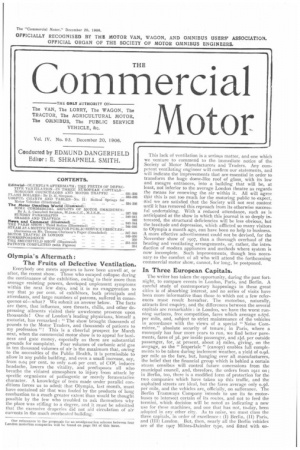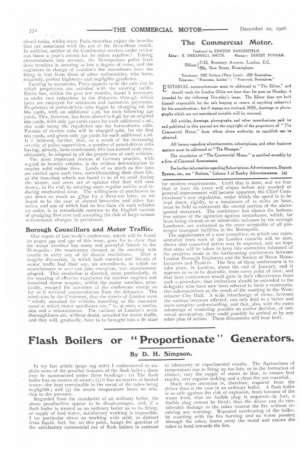Olympia's Aftermath: The Fruits of Defective Ventilation.
Page 1

Page 2

If you've noticed an error in this article please click here to report it so we can fix it.
Everybody one meets appears to have been unwell at, or after, the recent show. Those who escaped collapse during the continuance of the exhibition, owing to their more than average resisting powers, developed unpleasant symptoms within the next few days, and it is no exaggeration to say that 30 per cent. of exhibitors, both principals and attendants, and large numbers of patrons, suffered in consequence of—what? We submit an answer below. The facts are there, that influenza, sore throats, chills, and other depressing ailments visited their unwelcome presence upon thousands! One of London's leading physicians, himself a motorist, has remarked : "The show brought thousands of pounds to the Motor Traders, and thousands of patients to my profession "! This is a cheerful prospect for March next, when the commercial motor show is to appeal for business and gate money, especially as there are substantial grounds for complaint. Four volumes of carbonic acid gas in ten thousand volumes of air is the maximum that, owing to the necessities of the Public Health, it is permissible to allow in any public building, and even a small increase, say, from 0.04 per cent. to only o.o6 per cent. of COT, induces headache, lowers the vitality, and predisposes all who breathe the vitiated atmosphere to injury from attack by specific organisms of pathogenic or merely fermentative character. A knowledge of tests made under parallel conditions forces us to admit that Olympia, last month, must have contained air that was fouled by the products of lung combustion to a much greater extent than would be thought possible by the few who troubled to ask themselves why the place was stifling to a degree, and it must be admitted that the excessive draperies did not aid circulation of air currents in the much overheated building. This lack of ventilation is a serious matter, and one which we venture to commend to the immediate notice of the Society of Motor Manufacturers and Traders. Any competent ventilating engineer will confirm our statements, and will indicate the improvements that are essential in order to transform the huge dome-like roof of glass, with its low and meagre entrances, into a building that will be, at least, not inferior to the average London theatre as regards the means for renewing the air within it. All will agree that this is not too much for the motoring public to expect, and we are satisfied that the Society will not rest content until it has removed this reproach from its otherwise successful undertaking. With a reduced attendance, such as is anticipated at the show in which this journal is so deeply interested, the structural deficiencies will be less obvious, but the lassitude and depression, which afflicted so many visitors to Olympia a month ago, can have been no help to business. A more effective advertisement could not be devised, for the November show of 1907, than a thorough overhaul of the heating and ventilating arrangements, or, rather, the introduction of modern appliances and methods where system is now incomplete. Such improvements, though less necessary to the comfort of all who will attend the forthcoming commercial motor show, cannot, for long, be postponed.
In Three European Capitals.
The writer has taken the opportunity, during the past fortnight, to compare events in London, Paris, and Berlin. A careful study of contemporary happenings in these great cities is of absorbing interest, and no series of visits have been more informative than those to which not a few references must result hereafter. The motorbus, naturally, attracts first enquiry, and the differences between the several capitals are remarkable : in London, we have the worst running surfaces, free competition, fares which average o.67d. per mile, and, subject to strict maintenance of the vehicles in accordance with the views of a special "Noise Committee," absolute security of tenure; in Paris, where a monopoly has four more years to run, we find better pavements, fares of 3d. per inside passenger, and rid. per outside passenger, for, at present, about 2t miles, giving, on the average, as the " Imperiale " (canopy) enables full complements to be taken during inclement weather, a yield of o.9d. per mile as the fare, but, hanging over all manufacturers, the belief that the financial group which is behind a certain steam omnibus will control future concessions from the municipal council, and, therefore, the orders from 191/ on ; in Berlin, too, there is a modified form of protection for the two companies which have taken up this traffic, and the asphalted streets are ideal, but the fares average only o.sd. per mile, and the vehicles are, officially, on sufferance. The Berlin Tramways Company intends to use its 6o motorbuses to intersect certain of its routes, and not to feed the termini, which decision will be noted as indicating a new use for these machines, and one that has not, to-day, been adopted in any other city. As to noise, we must class the three capitals, in order of excellence : (I) Berlin, (11) Paris, and (III) London. But, then, nearly all the Berlin vehicles are of the 19o7 Milnes-Daimler type, and fitted with en closed racks, whilst every Paris motorbus enjoys the benefits that are associated with the use of the fiete-Shaw clutch. ln addition, neither of the Continental services under review can boast a year's record for its oldest machine ! Taking circumstances into account, the Metropolitan police have done wonders in securing so low a degree of noise, and the engineers in charge of London's loo motorbuses have nothing to fear from'Loh
ose of other nationalities, who have, relatively, perfect highways and negligible gradients.
Turning to motorcabs, Paris appears to be the only city in which proprietors are satisfied with the existing tariffs. Berlin has, within the past few months, found it necessary to make two reductions in the distances thro...tgh Nyhicki fares are conveyed for minimum and increment payments. Proprietors of petrol-driven cabs began by charging hd. for tib'o yards, with an additional 1.2d. for each following 440 yards. This, however, has been altered to8.4d. for an original otio yards, with only 330 yards extra for each additional I.2d., this scale being the regulation one for horse-drawn cabs. Patrons of electric cabs will be charged 9.6d. for the first ntio yards, and given only 330 yards for each additional 1.2d. It is believed, further, that, as a result of the increasing severity of police supervision, a number of petrol-driven cabs having, already, been condemned, this last-named scale may, ultimately-, be adopted by all the proprietors of such vehicles.
The most important feature of German practice, with regard to heavier vehicles, is the evident determination to employ solid rubber tires. Loads of as much as five tons are carried upon such tires, notwithstanding their short life, as the iron-shod wheels are found to be of no avail during the winter, and users are of opinion that they will save money, in the end, by securing more regular service and reducing mechanical wear. The willingness of purchasers to put down as much as L;Sso for a three-ton lorry, as we found to he the case at several breweries and other factories, and one of which had no less than six such vehicles on order, is in remarkable contrast to the English custom of grudging first cost and accepting the risk of large annual maintenance charges in preference.
Borough Councillors and Motor Traffic.
Our report of last week's conference, which will be found on pages 349 and 350 of this issue, goes far to show that the motor omnibus has many and powerful friends in the Metropolis : the reactionary (lenient at the meeting was unable to carry any of its drastic resolutions. After a lengthy discussion, in which both enemies and friends of motor traffic: had their say, an amendment, to which no manufacturer or user ran take exception, was unanimously adopted. This resolution is directed, more particularly, to the securing of effective regulation for traction engines and iron-tired motor wagons, whilst the motor omnibus, practically, escaped the attention of the conference except so far as it received commendation from the delegates. The admission by the Chairman, that the streets of London were wholly unsuited for vehicles travelling at the excessive speed at which motor omnibuses ran," is, at once, a confession and a misstatement. The i_irfaces of London's main thoroughfares are, without doubt, unsuited for motor traffic, and they will, gradually, have to be brought into a fit state
EDITORIAL communications must be addressed to "The Editor," and should reach the London Office not later than 1st post on Monday. ii intended for the following Thursday's issue. The Editor does not hold himself responsible for the safe keeping or return of anything su6mittel for his consideration: but if stamps are enclo..a, mss., drawings or photographs which are not considered suitable will be returned.
All articles, drawings, photographs, and other contributions paid lot and published in this journal are the copyright of the proprietors of "The Commercial Motor," from whom alone authority to republish can be obtained.
All letters regarding advertisements, subscriptions, and other business matters must be addressed to The Manager,"
The circulation of "The Commercial Motor " is certified monthly by a firm of Chartered Acommtents.
For further information regarding Subscriptions.Advertisements„ Deposit System, etc., see " Notices." Column 1 of Sundry Advertisement& (a)
for modern requirements. Until that is done, and we fear that at least six years will elapse 'before any marked or
general improvement will become apparent, the Chief Commissioner's new regulation, under which the speed is to be kept down, rigidly, to a maximum of 12 miles an hour, must be held to controvert the second portion. of the abovequoted statement. The conference has shown the bottomless nature of the agitation against motorbuses, which, far from being viewed as an intolerable nuisance by the average Londoner, are welcomed as the most acceptable of all passenger transport facilities in the Metropolis.
The appointment of a new committee, to which one representative from each of the London councils will be sent, shows that concerted action may be expected, and we hope that steps will be taken to keep this committee informed of the progress made at the forthcoming conferences between London Borough Engineers and the Society of Motor Manufacturers and Traders. The first of these conferences is to take place, in London, about the end of January, and it appears to us to be desirable, from every point of view, and that later conferences would gain in their effectiveness from such a procedure, that invitations should be extended to the delegates who have now been selected to form a representative sub-committee as the result of the meeting in the Westminster City Hall. A wide interchange of views, between the various interests affected, can only lead to a better and more complete understanding, and that, also, with the extra advantage of rendering possible an earlier decision, of universal acceptation, than could possibly he arrived at by any other plan of action. These discussions will bear fruit.


























